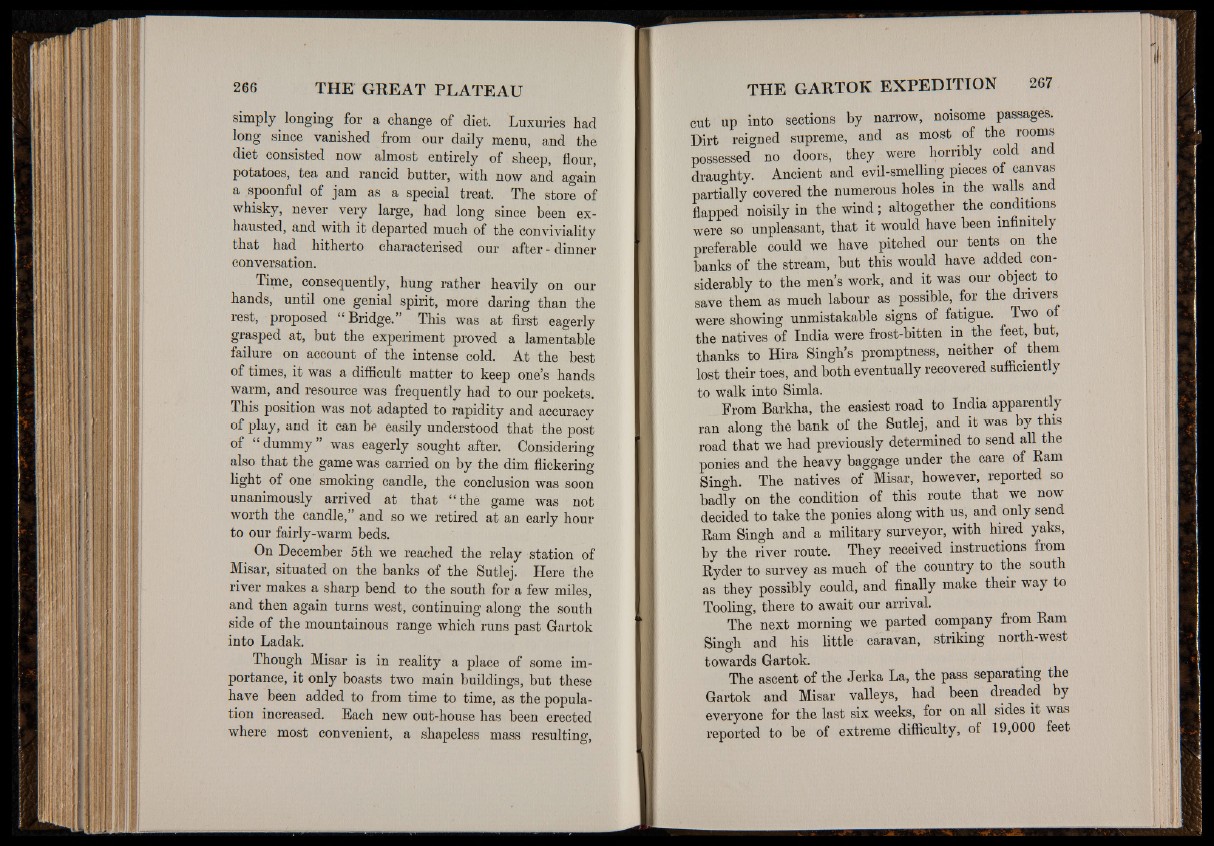
simply longing for a change of diet. Luxuries had
long since vanished from our daily menu, and the
diet consisted now almost entirely of sheep, flour,
potatoes, tea and rancid butter, with now and again
a spoonful of jam as a special treat. The store of
whisky, never very large, had long since been exhausted,
and with it departed much of the conviviality
that had hitherto characterised our after - dinner
conversation.
Time, consequently, hung rather heavily on our
hands, until one genial spirit, more daring than the
rest, proposed “ Bridge.” This was at first eagerly
grasped at, but the experiment proved a lamentable
failure on account of the intense cold. At the best
of times, it was a difficult matter to keep one’s hands
warm, and resource was frequently had to our pockets.
This position was not adapted to rapidity and accuracy
of play, and it can bp easily understood that the post
of “ dummy” was eagerly sought after. Considering
also that the game was carried on by the dim flickering
light of one smoking candle, the conclusion was soon
unanimously arrived at that “ the game was not
worth the candle,” and so we retired at an early hour
to our fairly-warm beds.
On December 5th we reached the relay station of
Misar, situated on the banks of the Sutlej. Here the
river makes a sharp bend to the south for a few miles,
and then again turns west, continuing along the south
side of the mountainous range which runs past Gartok
into Ladak.
Though Misar is in reality a place of some importance,
it only boasts two main buildings, but these
have been added to from time to time, as the population
increased. Each new out-house has been erected
where most convenient, a shapeless mass resulting,
cut up into sections by narrow, noisome passages.
Dirt reigned supreme, and as most of the rooms
possessed no doors, they were horribly cold and
draughty. Ancient and evil-smelling pieces of canvas
partially covered the numerous holes in the walls and
flapped noisily in the wind; altogether the conditions
were so unpleasant, that it would have been infinitely
preferable could we have pitched our tents on the
banks of the stream, but this would have added considerably
to the men’s work, and it was our object to
save them as much labour as possible, for the drivers
were showing unmistakable signs of fatigue. Two of
the natives of India were frost-bitten in the feet, but,
thanks to Hira Singh’s promptness, neither of them
lost their toes, and both eventually recovered sufficiently
to walk into Simla.
From Barkha, the easiest road to India apparently
ran along the bank of the Sutlej, and it was by this
road that we had previously determined to send all the
ponies and the heavy baggage under the care of Bam
Singh. The natives of Misar, however, reported so
badly on the condition of this route that we now
decided to take the ponies along with us, and only send
Bam Singh and a military surveyor, with hired yaks,
by the river route. They received instructions from
Byder to survey as much of the country to the south
as they possibly could, and finally make their way to
Tooling, there to await our arrival.
The next morning we parted company from Bam
Singh and his little caravan, striking north-west
towards Gartok. j
The ascent of the Jerka La, the pass separating the
Gartok and Misar valleys, had been dreaded by
everyone for the last six weeks, for on all sides it was
reported to be of extreme difficulty, of 19,000 feet